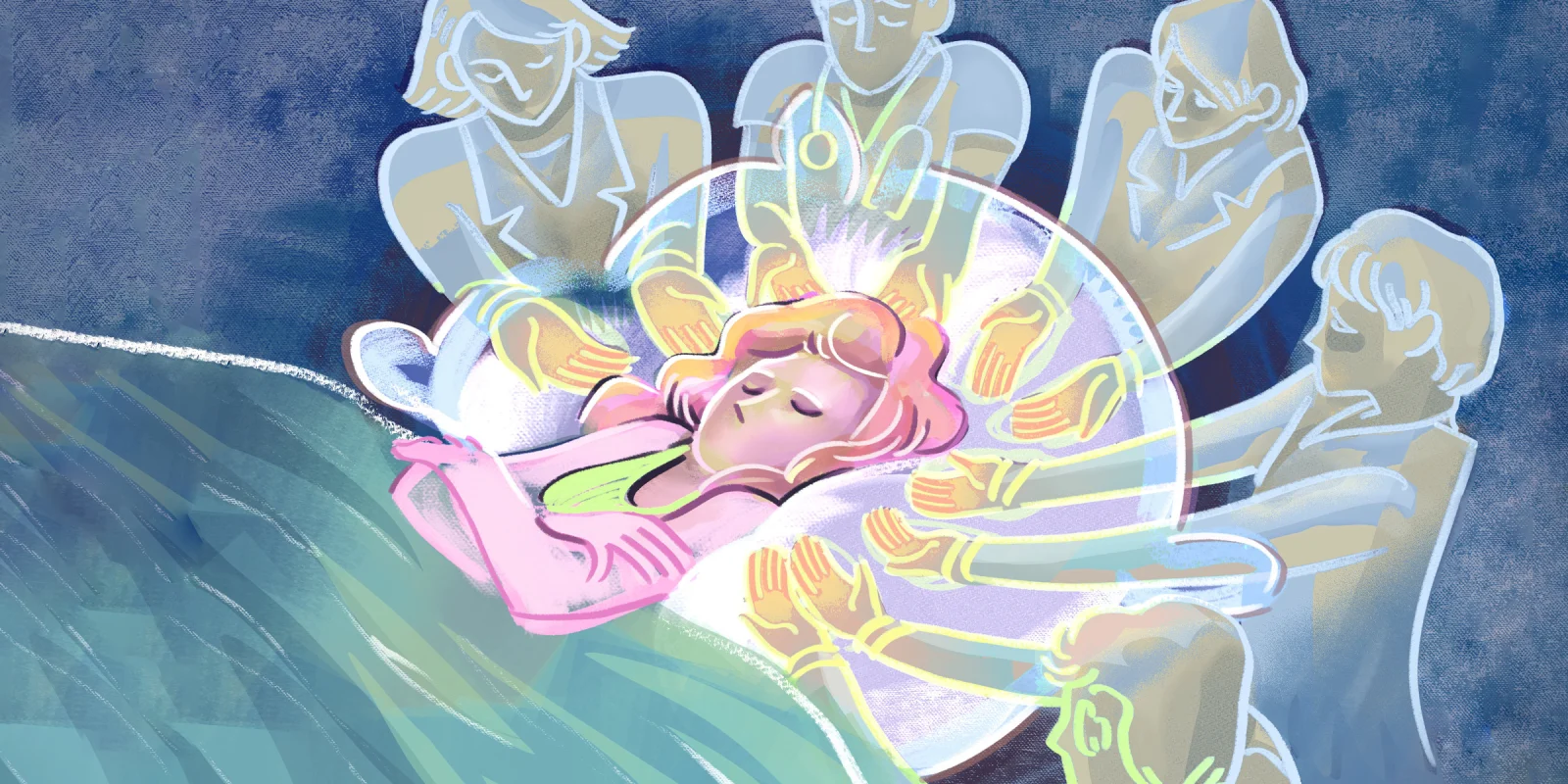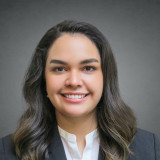“I can talk to them about goals of care,” the patient’s daughter, Vanessa, reassured me, “I’m not scared to have these conversations.”
I was in the oncology unit with first-year medical students. As their fourth-year group leader, I was supposed to be teaching them about the patient-doctor relationship, but today, my goal was just to watch. Their objective was to learn how to have difficult conversations with a patient, such as end-of-life planning and goals of care. The patient herself was 90 years old and asleep, lilting to the side as she dozed upright in the hospital bed. Her adult daughter was beside her, a cath lab nurse with sharp eyes and gray hair.
It was sweltering in the patient room, and the MS1 leading the interview was trying to keep himself composed despite the heat. He eagerly started to ask Vanessa about the patient’s code status and whether they’d thought about her goals of care. It was a striking image, the first-year medical students sitting around their geriatric patient’s bed. In many ways, their journey was just beginning. For the patient, the end was steadily drawing near.
“Is spirituality important to you?” the student asked.
“Absolutely,” Vanessa replied. “We go to church every week. We’re Christian,” she elaborated, “so we believe in Heaven.”
Her dad, who had long since passed, was not a churchgoer, but she and her mother were. They’d had a lot of time to think about how they wanted to handle her mother’s death.
“We aren’t scared of death,” she said, referring to herself and the patient. “My mother wants to see my dad again.”
Vanessa paused for a minute, and then asked, “Do you know the difference between religion and faith?”
The first-year students shook their heads.
“I want to make that distinction to you: religion is going to church, but faith is being excited to see what’s on the other side,” she said.
Before that day, I never thought much about faith in either a personal or professional context. I had started my journey to medicine believing that the health care industry was a well-oiled machine. Decisions were made based on expert-driven guidelines, peer-reviewed research studies, and robust clinical evidence. Algorithms and treatment pathways existed to minimize variables and reduce the number of unknowns. I didn’t question if these things were true — the information was given to me by experts who told me that the algorithms were based on robust scientific evidence, validated by years of experience. What room is there for faith?
I understand and accept that many physicians are religious, and incorporate their beliefs into their practice. However, what Vanessa was talking about was different. It wasn’t a matter of worshiping a deity or living in congruence with teachings from sacred texts. Her kind of faith was more imprecise — a complete trust in what lies ahead, even if you don’t know what it entails.
Faith has multiple definitions. Often it is used to describe a set of religious beliefs and is used interchangeably with the word “religion.” However, another definition of faith is “complete trust or confidence in someone or something.” It wasn’t until I was knee-deep in rotations that I began to understand the role of faith in medicine, both the concept and the consequences of it.
In my final year of medical school, I grew attached to a patient I was seeing on my endocrinology rotation. Ms. Ida was young, still in her 40s, with an unusually complicated cardiac history for her age. She was a single mother to two teenage children, and subsidized her livelihood on welfare services. Life had dealt her a tough hand, but she was vivacious and good-natured. She had arrived at the hospital in diabetic ketoacidosis (DKA) from Type 2 diabetes. When I first met her, on a Friday, the ER team had already done the critical work of stabilizing her and starting her on an insulin drip. The endocrine team’s goal was to find out why she dropped into DKA and modify her outpatient diabetes regimen to prevent it from recurring. As the week progressed and she gradually recovered, she was feeling hopeful about her health, and was ready to leave and get back to her children. I couldn’t help but feel optimistic as well; it felt like she was almost out of the woods.
That evening, Ms. Ida had a run of sustained ventricular tachycardia, went into cardiogenic shock, and was transferred to the cardiac care unit. When I returned on Monday, she was intubated, sedated, and steadily deteriorating. I was shocked. Of course I was. When I had last seen her, Ms. Ida was fine – great, even – and about to be discharged. Her health taking a critical turn was not a possibility I had considered.
I was part of the endocrinology team; our role was to manage her blood sugars, which became obsolete once she was started on an insulin drip protocol. My participation in her care became limited to reading her notes, and nothing more. Every day for the remainder of my rotation, the first thing I did was check my census to see if she was still on it. Did Ms. Ida make it through the night? Then the next morning. Is Ms. Ida still here? And the next. Still here? And the next, and the next. She’s here, she’s here.
It felt like Ms. Ida was hanging on by a thread. For days, it seemed like she would sustain one crisis after another: runs of v-tach requiring defibrillation, emergent ECMO cannulation, and then in an unexpected upswing, listed for a heart transplant at UNOS Stage 1 before suddenly being dropped to Stage 7 because she was too unstable for surgery. I was swinging back and forth between dread that she would die overnight and hope that she would make it another day.
It was over weeks of stalking her chart that I finally realized that medicine is both an act of science and act of faith. I was attached to Ms. Ida, and invested in her well-being. I wanted to see her receive her heart transplant and return home to her children. Intellectually, I knew that the physicians caring for her were talented and well trained, and the nurses were diligent and compassionate. In my role as a student, my actions were limited. The only thing I could do was have faith that her cohort of clinicians would continue to work tirelessly to sustain her even though her body was failing.
Having faith is hard. I understand that now. Trusting in someone or something external to yourself, fully unhindered, felt impossible. And I don’t know how Ms. Ida’s story ends — or ended. She was still unstable but holding on when my rotation ended. Until I return to that hospital, I won’t know what happened. In both its presence and its absence, faith is inextricable to medicine. Patients, stuck between their health and a hard place, often have little choice but to place their trust in us. I’ve seen my attendings mull over complex patients who don’t fit the textbook presentation and make tough treatment decisions, rooted in experience and trust in their own clinical judgement.
And now, today, I find that my faith is being tested again. My journey in medical school is finally coming to a close, and come spring, I will match or I won’t, I will stay or I will go, and the implications of that journey will be irreversible. It is a necessary ending in exchange for a new beginning, and I am struck with the thrill and the fear of facing the unknown beyond the moment that will mark the finish line.
Faith, I’ve learned, is trusting that, when you are at a crossroads, the outcome will be exactly as it needs it to be. In other ways, faith is welcoming the crossroads, even when you cannot control it.
It’s currently winter in New England. Experience is how I know that seasons are temporary, but before I had experience, I only had faith that what dies in winter will bloom again in spring. For now, I’m suspended in a liminal space between ending and beginning. I don’t know where the road goes from here, but I’m excited to see what’s on the other side.
Do you have faith when you’re in liminal spaces? How do you find it? Share your journey in the comments.
A Texas native and Massachusetts transplant, Dallas Walter is a fourth-year medical student at Tufts University School of Medicine applying into general surgery. Her personal interests include social disparities of health, diversity in medicine, and stand-up comedy. Dallas is a 2021–2022 Doximity Op-Med Fellow.
All names and identifying information have been modified to protect patient privacy.
Illustration by April Brust






